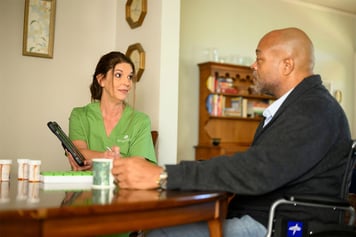Imagine that you are looking forward to a relaxing day. You take a long shower, put on your favorite button down shirt and pair of jeans, and make yourself a cup of coffee. You are ready for your day.
Now picture you have experienced an injury, illness or have a chronic condition and how that would change your experience. You really want to get in the shower but you are too afraid of falling so you wash off at the sink instead. Your favorite pair of jeans are so comfortable but too hard to zip and button that you give up and pull on a pair of sweatpants. You have trouble reaching around to place your arm in your shirt sleeve, you are having shoulder pain and those buttons seem so small. You realize it is just too hard, you really don’t like that sweatshirt but it is easier. While making coffee, you confuse the sugar with the salt and have to throw it away. You are no longer looking forward to your day, you are stressed out, and the most basic activities are overwhelming.
[action 1]
This daily struggle is often the case for our patients.
Fortunately here at Amedisys, we have 1,000 Occupational Therapists (OTs) and Occupational Therapy Assistants (OTAs) who work each and every day to empower patients to improve their ability to complete Activities of Daily Living (ADLs) and accomplish meaningful activities. Our OTs and OTAs have expertise in addressing the patients' ADL needs including home safety recommendations, providing adaptive equipment training, low-vision strategies, utilizing functional cognition strategies, decreasing anxiety and improving independence in the home. Occupational therapy helps people do the things they want and need to do through the therapeutic use of daily activities.
April is National Occupational Therapy Month, and it is a time to celebrate the occupational therapy clinicians who are crucial in the holistic care of our home health patients.
Occupational Therapy is an evidence-based practice established in 1917 that is deeply rooted in science. According to the Bureau of Labor Statistics, the employment of OTs and OTAs is projected to grow 24 percent by 2026, much faster than the average for all occupations. An independent study published in Medical Care Research and Review found that, “Occupational therapy is the only spending category where additional spending has a statistically significant association with lower readmission rates.”
The American Occupational Therapy Association also states, “Occupational therapy practitioners enable people of all ages to live life to its fullest by helping them promote health, and prevent—or live better with—injury, illness, or disability.”
Take some time to thank an OT or OTA today for their incredible work!
--
Sources:
Rogers, A. T., Bai, G., Lavin, R. A., & Anderson, G. F. (2016, September 2). Higher hospital spending on occupational therapy is associated with lower readmission rates. Medical Care Research and Review, 1–19. dx.doi.org/10.1177/1077558716666981
https://www.bls.gov/ooh/healthcare/occupational-therapists.htm#tab-6
https://www.aota.org/Conference-Events/OTMonth/what-is-OT.aspx





